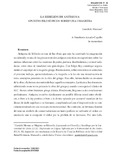La rebelión de Antígona: apuntes filosóficos sobre una tragedia
Fecha
2021-11-10Autor
Palabras Clave
Poder, Justicia humano-positiva, Justicia divino-positiva, Desobediencia, Conservadurismo, AntígonaPower, Human-positive justice, Divine-positive justice, Disobedience, Conservatism, Antigone
Metadatos
Mostrar el registro completo del ítemResumen
Antígona de Sófocles es una de las obras que más ha cautivado la imaginación
occidental y es una de las piezas teatrales antiguas más ricas en sugestiones sobre las
mutuas relaciones entre las nociones de poder, justicia, desobediencia y conservadurismo,
entre otras de tonalidad más psicológica. Con Edipo Rey constituye seguramente
el arquetipo de la tragedia griega. Precisamente, sobre estas ideas se estructura
el presente trabajo, aproximándonos a la tragedia a la luz de una tematización de
estos conceptos presentes en la obra del griego. Para ello, hemos hecho un resumen
de la obra y la hemos reconstruido bajo aquellos conceptos. La técnica fue documental
teniendo como texto primario la obra del griego y usando como guía el clásico de
M.C. Bowra sobre literatura griega clásica. Finalmente, llegamos a dos conclusiones
preliminares: Antígona resuelve rápidamente un posible dilema moral entre obedecer,
o bien a la ley positiva o bien a la divina optando por acatar el mandato de los
dioses de darle sepultura a su hermano, cumpliendo así con el imperativo de su conciencia
enraizada en una marcada estructura ritual. En contraste, su hermana Ismene
deviene en símbolo de conservadurismo en tanto prefiere no subvertir el orden comunitario
aun si comparte el dolor por la pérdida de su hermano. Por otro lado,Creonte entra en una
dramática situación paradójica: cumplir con la ley de la cual es
máximo preceptor o, en tanto comparte con Antígona el mismo ethos y tradición
heredada, cumplir con el ritual divino del entierro de su hijo y de su mujer.
Colecciones
Información Adicional
| Otros Títulos | The rebellion of Antigona: philosophical notes about a tragedy |
| Correo Electrónico | gendrikmh@gmail.com |
| Editor | SaberULA |
| ISSN | 1316-7839 |
| Resumen en otro Idioma | Sophocles' Antigone is one of the works that has most captivated the Western imagination, and it is one of the richest ancient theater pieces in suggestions about the mutual relationships between the notions of power, justice, disobedience and conservatism, among others. As well as Oedipus the King, it is an archetype of Greek tragedy. The present article is structured according to these ideas, while approaches the tragedy in the light of a thematization of concepts as they are present in the Greek's work. With this purpose we have made a summary of this work and have reconstructed it after those concepts. We applied a documentary method by following as primary text the work of the Greek, and also using the study by M.C. Bowra on Classical Greek Literature. Finally, we reach two preliminary conclusions: Antigone quickly resolves a possible moral dilemma, as she has to choose whether to obey the positive law or the divine law instead, thus she chooses to bury her brother and therefore she obeys the gods' command. So she follows her consciousness' imperative which is rooted into a strong ritual structure. By contrast, her sister Ismene becomes a symbol of conservatism, because she prefers not subverting the community's order, even if she shares the pain over the loss of her brother. On the other hand, Creon is placed into a dramatic paradoxical situation: complying with the law,which he must respect as its highest preceptor or complying with the divine ritual of the burial of his son and his wife, given that he shares with Antigone the same ethos and inherited tradition. |
| Colación | 109-128 |
| Periodicidad | Anual |
| País | Venezuela |
| Institución | Universidad de Los Andes |
| Sección | Dikaiosyne: Artículos |






